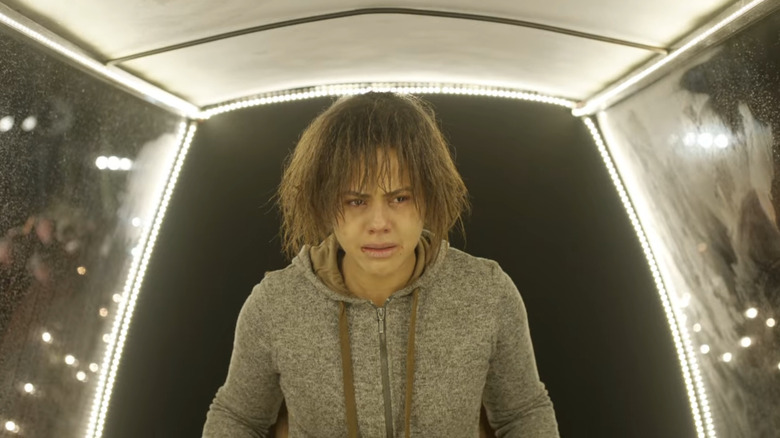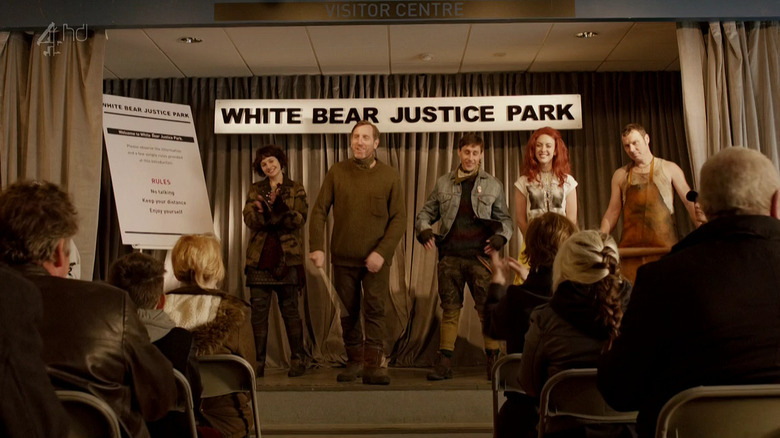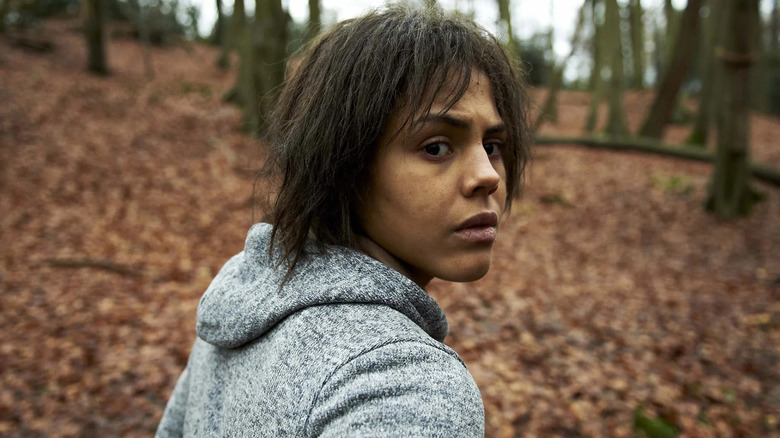
Considering how controversial the first, pig-centric episode of "Black Mirror" is, fans of the dystopian anthology show often debate amongst themselves the best episode for introducing new viewers to the series. Do you go with an easygoing crowd-pleaser like "San Junipero," to make sure the viewer won't be scared off? Or do you go for a dark, twisted episode like "Shut Up And Dance," which will make the viewer want to take a shower afterward? It's a tough question. You don't want the show to come on too strong, but "Black Mirror" is an inherently abrasive show. Half the time, it seems like dread and nausea are its two main goals.
That's why "White Bear" might be the best introductory episode. It starts off as a story about an apocalypse where some sort of zombie virus has infected people through their phones, which is exactly the sort of plotline you'd expect from "Black Mirror" based on the memes about it. But then the rug gets pulled out from under us, and it's revealed that the episode is barely a commentary on phones at all. Instead, it's a much more timeless critique of mankind's bloodlust, of our desire to punish people who "deserve it" to such an extent that we become even more monstrous than the people we're punishing. Add on the memory-wiping element — if a person can't remember the crime they committed, can you even still hold them responsible for it? — and you get an incredibly layered, thoughtful installment that'll stick with you for weeks.
That big twist in "White Bear" is what elevates it from a so-so episode to one of the best in the whole show, so you might be surprised to learn that it almost wasn't there at all.
A Last Minute Shakeup

"It was a straightforward apocalypse story," showrunner Charlie Brooker explained in a 2016 interview. "It was a woman wakes up and there's a signal going across the world affecting people. The original ending had a public crucifixion." The idea of the ending we're all familiar with didn't occur to Brooker until after they started location-scouting for the episode, which involved looking around a former U.S. Air Force base. As Brooker put it:
"We were looking around at what we could use... I saw the housing, a gas station, and I saw this fence running around outside the place. I was like, 'That's interesting, there's a fence. A fence. A fence!' And the twist suddenly occurred to me. I ran off and wrote it in a couple days in a bit of a fever dream."
It's a surprising explanation, because it's hard to re-watch the first two thirds of the episode and not feel like the entire thing was written with the twist in mind. While Brooker did of course rewrite the whole episode and not just tack on the ending, the coherence of it all still feels like a miracle. The episode is incredibly chaotic on first watch, but it always feels like controlled chaos. It's never messy in the way that productions with last minute changes so often are.
Possibly The Most Important Episode

"It was Darwinian in that such a better idea came along," Brooker explained. The new idea for the episode killed the earlier, weaker idea, for the benefit of the show as a whole. Not only that, but the basic ideas behind "White Bear" were so compelling that the show revisited them constantly throughout the next few seasons. Episodes like "White Christmas" and "Shut Up and Dance" both feature characters who do something terrible, but are then punished so severely that you can't help but feel bad for them anyway.
"Black Mirror" is fascinated by how a lot of people's ideas of justice are nearly indistinguishable from straightforward sadism, and how advancements in technology might make this problem so much worse. It was "White Bear" that first sparked that interest within the series, and it wasn't really until "Black Museum" that the show seemed to have finally exhausted all of its storytelling potential.
Of course, that wasn't before they pulled off "Hated in the Nation," perhaps the most thorough exploration of this idea the show's offered so far. The feature-length season 3 episode centers around hundreds of thousands of Twitter users engaging in a deadly cyberbullying game. The tables turn on them at the end, however, and they're all brutally murdered by robot bees. Considering how frustrating their actions were throughout the episode, this could have been a satisfying ending, but it isn't. "Black Mirror" takes the stance that nobody deserves to be tormented by self-righteous sadists, not even the self-righteous sadists themselves.
We're not sure if "Black Mirror" will return to this kind of material in the upcoming season 6, but whatever the new episodes are about, hopefully Brooker's maintained his willingness to improvise that made "White Bear" so great.
Read this next: The Most Controversial Scenes In Sci-Fi Movies
The post Black Mirror's White Bear Twist Was A Last-Minute Addition To The Script appeared first on /Film.
